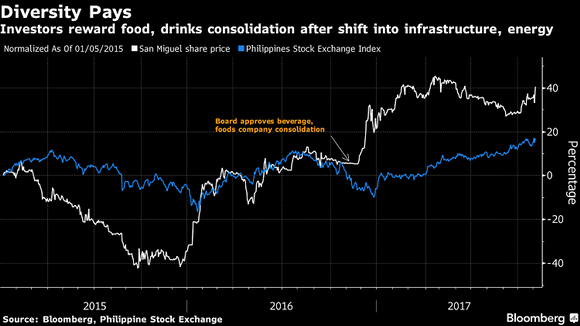San Miguel Corp., the Philippines’ largest company, expects to raise as much as $3.6 billion selling shares of its merged food and drinks unit in the fourth quarter in what could be the country’s biggest share sale on record.
San Miguel Food and Beverage Inc., which combined three businesses of the group, is now worth $12 billion, President Ramon Ang told reporters at a meeting in Manila on Tuesday. Selling a 30 percent stake may raise as much as $3.6 billion, while a 20 percent slice would generate about $2.4 billion, he said.
Investors have welcomed Ang’s consolidation of the group’s food and beverage business, helping push the parent’s shares up 21 percent in 2017 and another 27 percent so far this year. The merger makes it easier to make bets on growth in the company’s more than a century-old beer business or on the oil, energy and infrastructure businesses that have helped increase sales by more than five times over the past decade.

“Old businesses are usually forgotten during diversification, but that didn’t happen in our case,” Ang said in Mandaluyong City, Philippines. “We continue to grow and remain bullish on this sector.”
The group’s recurring profit may reach between 65 billion pesos ($1.3 billion) and 70 billion pesos this year from about 55 billion pesos in 2017, with oil unit Petron Corp. and its merged food and drinks business accounting for the bulk, Ang said.
Ang is counting on Philippine economic growth that has topped 6 percent annually in the past six years to help boost sales and fuel San Miguel’s expansion into heavy industries. Projects include an airport that could complement the capital’s 70-year-old facility, which has been ranked among the world’s worst as it handles well beyond the 30 million passengers it was intended to serve.
The company’s 736 billion-peso airport proposal is up for final review by President Rodrigo Duterte and his cabinet. The facility could be completed five years from final approval, Ang said.
Petron Corp., the nation’s largest oil company, will likely see profit rise to least 18 billion pesos this year from 14.1 billion pesos in 2017 as its refinery runs on its full 180,00-barrel-per-day capacity. The company plans to expand by 90,000 barrels per day, which may cost at least $5 billion, Ang said.
Bloomberg




